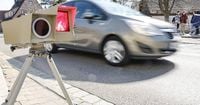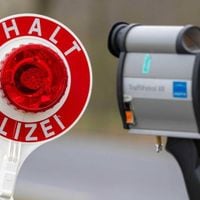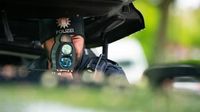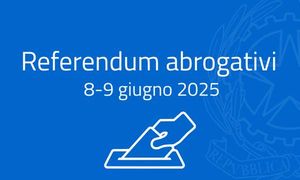As April unfolds, drivers across Germany are bracing for a week of intensified speed checks, part of the annual Blitzermarathon, or Speedweek, aimed at enhancing road safety. From April 7 to April 13, 2025, various states will ramp up their efforts to monitor vehicle speeds, particularly in accident-prone areas and near schools and daycare centers.
The peak of this initiative will occur on April 9, a day designated for heightened enforcement across many regions. This year, the Blitzermarathon is coordinated by the European traffic police network, Roadpol, which has also called on European countries to participate in increased speed checks on April 18 and 19.
Nearly all German states will engage in the Blitzermarathon, with notable participation from Baden-Württemberg, Bavaria, Brandenburg, Bremen, Hamburg, Hesse, Mecklenburg-Vorpommern, Rhineland-Palatinate, Schleswig-Holstein, and Thuringia. However, some states, such as Berlin and Saarland, will contribute minimally or not at all, citing staffing shortages and doubts regarding the effectiveness of such campaigns.
In Baden-Württemberg, for instance, police will focus their speed checks in major cities, including Stuttgart, Mannheim, Karlsruhe, Freiburg, Heidelberg, and Heilbronn. The Bavarian police plan to conduct increased speed checks at approximately 1,470 locations from April 9 to 10.
Brandenburg's police will primarily target the numerous avenues in the region, while also focusing on motorcyclists on April 7 and 8. Hesse will monitor speeds on April 7 from 6 AM to 10 PM, and Niedersachsen will implement checks throughout the week rather than just on a designated day.
North Rhine-Westphalia (NRW) presents a unique situation this year. While it will not participate in the Blitzermarathon on April 9, the state will still conduct extensive speed checks throughout the week. This decision allows for a more consistent enforcement approach, rather than a single day of heightened scrutiny. The NRW police will align with the ROADPOL Operation Speed, which runs concurrently from April 7 to April 13 and again from August 4 to August 10, 2025.
According to the NRW Interior Ministry, each of the 47 district police authorities will determine the extent of their participation in these speed checks. The Aachen police department, for example, plans to focus on known racing routes and accident hotspots where speed is a primary cause of incidents.
Ulrich Chiellino, a traffic psychologist with the ADAC, emphasizes that speed limits should be regarded as strict boundaries rather than mere suggestions. He notes, "The speed must be adapted to the surroundings. In this sense, a speed limit should be understood as a limit and not as a recommendation." Chiellino advocates for continuous self-reflection among drivers regarding their speed and behavior on the road.
The penalties for speeding can be significant. For instance, a violation of 10 km/h over the limit in urban areas can lead to a fine of 58.50 Euros, while exceeding the limit by 31 to 40 km/h may result in a one-month driving ban and a fine of 288.50 Euros.
Despite the focus on enforcement, there are concerns regarding the Blitzermarathon's efficacy. Critics argue that while drivers may adjust their speeds temporarily during enforcement weeks, these changes do not lead to long-term behavioral shifts. The ADAC maintains that such initiatives raise awareness about the dangers of speeding, but the challenge remains to ensure that these lessons translate into consistent safe driving practices.
In addition to the Blitzermarathon, the ADAC is pushing for more targeted controls by police throughout the year. Roman Suthold from ADAC Nordrhein asserts, "Only when appropriate penalties and a high likelihood of being caught work together will more drivers who currently do not adhere to speed regulations change their behavior."
In preparation for the Blitzermarathon, drivers are advised to remain vigilant, especially in areas identified for increased monitoring. This includes locations near schools, kindergartens, senior citizen homes, playgrounds, and construction sites, where speed limits are often strictly enforced.
As the Blitzermarathon approaches, drivers are reminded that the responsibility for road safety lies with them. Adhering to speed limits not only protects themselves but also safeguards vulnerable road users, particularly children and the elderly.
Ultimately, while the Blitzermarathon aims to reduce speeding and improve road safety, it also serves as a reminder of the ongoing need for responsible driving practices. The campaign's effectiveness will depend on the willingness of drivers to internalize the lessons learned during these high-visibility enforcement periods.
With the Blitzermarathon set to commence, the call for safer roads resonates louder than ever. As drivers prepare for the increased scrutiny, the hope is that this initiative will foster a culture of speed awareness and responsibility on Germany's roads.









